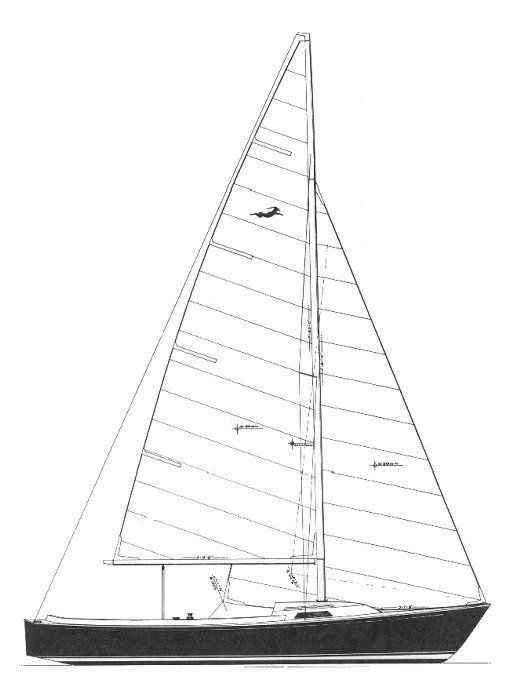The Gazelle 22 is a lively and compact sailboat, designed for sailing enthusiasts seeking a nimble yet capable vessel for coastal cruising and day sailing. Measuring just over 22 feet in length, she combines a performance-oriented design by the renowned C&C Design Group with the quality construction ethos of Canadian builder Ontario Yachts. Produced at least from 1980, the Gazelle 22 carved a niche for itself as a fun-to-sail fractional sloop, offering an accessible entry into the world of fiberglass keelboats.
Gazelle 22 Information, Review, Specs

- Make
- Model
- Number Built
- Production Year(s)
- 1980 - ??
History and Design
The Gazelle 22 began its production run in 1980, emerging from the boatyards of Ontario Yachts in Canada. The design came from the respected C&C Design Group, a firm celebrated for its successful blend of competitive racing performance and practical, comfortable layouts across its models. C&C Design Group, co-founded by George Cuthbertson and George Cassian, brought an engineering and aircraft design sensibility to yacht architecture, often pushing for performance in their creations.
During the era of the Gazelle 22's production, Ontario Yachts, under the leadership that would later include Dirk Kneulman Jr. and Don Oakie, was establishing a strong reputation for high-quality composite boat building. The company had successfully transitioned from traditional wooden boat construction to advanced fiberglass techniques, ensuring robust and durable vessels. This commitment to quality aligned with C&C's design principles, resulting in a well-built small sailboat. The Gazelle 22 shares design similarities with other contemporary 22-23 foot models, including the Classic 22, Grampian 22, Bluejacket 23 (Paceship), and Viking 22, suggesting a popular design archetype for the time.
Sailing Performance and Handling
Designed as a fractional sloop with a fin keel and spade rudder, the Gazelle 22 is characterized by its agility and responsive handling. SailboatLab.com describes the Gazelle 22 as a "light sailboat which is a high performer" and "reasonably stable / stiff". While performance ratios are less directly applicable for boats of this compact size, its light displacement of 2,018 pounds, combined with a total sail area of approximately 204 square feet, indicates a boat that can be spirited in a range of conditions. The vessel features a lead ballast keel, contributing to its stability, though a specific ballast weight is not widely documented.
The fin keel and spade rudder configuration is typical for designs aiming for good upwind performance and maneuverability, allowing the Gazelle 22 to respond quickly to helm input. Its fractional rig, with a tall P measurement of 25 feet and an I measurement of 21 feet, suggests a generous main sail area, contributing to its lively performance. While nimble, it is noted to have a "low righting capability if capsized", a characteristic often associated with lighter, more performance-oriented designs in this size category.
Accommodations and Layout
Given its length overall of just over 22 feet and a beam of 7.25 feet, the Gazelle 22 offers a compact interior typical of a weekender or small coastal cruiser. While detailed descriptions and photographs of the Gazelle 22's specific interior layout are not widely available in online resources, one can infer a practical arrangement designed to maximize usable space.
Most sailboats of this size from the early 1980s typically feature a V-berth forward, providing sleeping accommodations for two. A small main cabin often includes opposing settees that can serve as additional berths, a basic galley area with limited counter space and possibly a sink, and a dedicated or portable marine head. Storage is generally found under bunks and in various nooks and lockers. The emphasis in such compact designs is on functional utility for short trips rather than extensive living space. Without specific headroom measurements, it is likely to be modest, requiring some stooping for taller individuals.
Measurements
Construction & Hull
- Construction Material
- Fiberglass (Solid)
- Hull Type
- Monohull Sailboat
- Keel Type
- Fin
- Rudder
- 1x Spade
- Ballast
- - (Lead)
- Displacement
- 2018 lbs
- Water Capacity
- -
- Fuel Capacity
- -
Engine
- Engine Make
- —
- Engine Model
- —
- Engine Type
- —
- Engine HP
- —
- Engine Count
- 1
- Drive Type
- —
- Fuel Type
- —
Rig & Sails
- Rig Type
- Fractional Sloop
- P (Main Luff)
- 25 ft
- E (Main Foot)
- 9.8 ft
- I (Foretriangle Height)
- 21 ft
- J (Foretriangle Base)
- 7.8 ft
- Forestay Length (est)
- 22.4 ft
- Main Sail Area
- 122.5 sqft
- Foretriangle Sail Area
- 81.9 sqft
- Total Sail Area (Reported)
- 204 sqft
- Total Sail Area (Calc)
- 204.4 sqft
Dimensions
- LOA
- 22.25 ft
- LWL
- 17.5 ft
- Beam
- 7.25 ft
- Draft
- 3.67 ft
- Max Headroom
- -
- Air Draft
- -
Calculations
- Hull Speed
- 5.61 kn
- Pounds per Inch Immersion
- 453.34